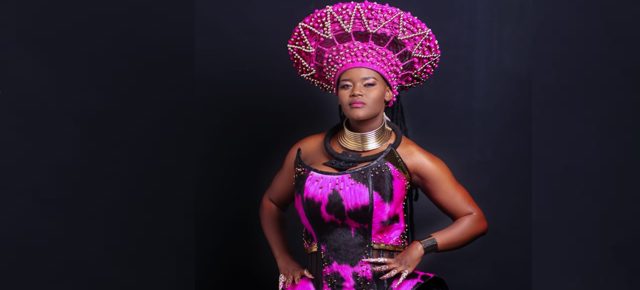
AWA KHIWE proudly calls herself “the village girl who decided to go for it”. Zimbabwean born Ndebele rap queen AWA KHIWE is rooted in her upbringing in Nkayi, a small rural village in Zimbabwe, and shaped by her urban experiences in Bulawayo. She spent several years in Germany using the time to take her music to the next level.
Zimbabwe’s rap queen unites worlds that rarely meet. One day she’s on dusty village roads directing her own music videos, the next she’s in a Berlin studio with Peter Fox, dropping Ndebele verses on a remix of his Amapiano hit “Zukunft Pink.” Then she’s back in the village, part-time herding cows, before flying out again to perform on stages across Europe. Fans at home follow every step on their phones, proud to see one of their own carrying their stories to places they’ve never been.
On stage, AWA KHIWE is wrapped in handcrafted Ndebele beadwork and headpieces. Her songs talk about social issues, migration, gender inequality and personal stories of empowerment. Her flow is tight, fast and punctuated by the click sounds of her mother tongue.
Now, her debut album “African Women Arise” merges hip hop, Afro-urban rhythms and the spirit of Ndebele culture. Her international breakthrough was fueled by collaborations with Ghanaian Stallion, known for his work with Megaloh, Patrice, Joy Denalane, Black Sherif, and Burna Boy. Since working with AWA, Stallion has adopted her shout-out “Stallion on the beat” as his producer tag. Together they’ve crafted a distinctive sound that blends African influences with contemporary hip hop, creating a bold pan-African identity. Adding further depth, Zimbabwe’s acclaimed band Mokoomba enriches the album with powerful vocal harmonies and driving guitar rhythms, while Ghana’s Kwashibu Area Band delivers brass arrangements on select tracks.
Across songs like “Zizobuya,” confronting domestic violence and the misuse of lobola, to “NgeMbombela” featuring Mokoomba’s Matthias Mzuzu, spotlighting families torn apart by labor migration, AWA shines a light on hidden struggles. “Uthando alulamgoqo” questions child marriage and the conflict between material security and true love. “Thula ngane yami” addresses a mother’s hardships, while “Ngiceluxole” reveals a woman’s remorse over her own toxic behavior. “Rise Again” pairs AWA with London- based Baby SOL in a call to resist political suppression, and “Higher,” featuring Ghanaian powerhouse Wiyaala, stands for resilience and self- confidence. “Qaphela” warns girls against older men who promise luxury but leave them heartbroken, or worse, facing teenage pregnancy.
Long awaited by fans across Europe, Africa, and beyond, “African Women Arise” offers her powerful perspective. For AWA, this album is both a personal manifesto and a rallying cry. “We are often given the crumbs and labeled as ‘the other rappers,’ but that will not change unless women unite and claim our space,” she says. With this album, AWA KHIWE firmly steps onto the global stage, blazing a trail for African women in rap and lighting the way for a new generation that refuses to be sidelined.
AWA KHIWE – VIDEO CHANNEL
AWA KHIWE – About the album
AWA KHIWE – ZIZOBUYA






